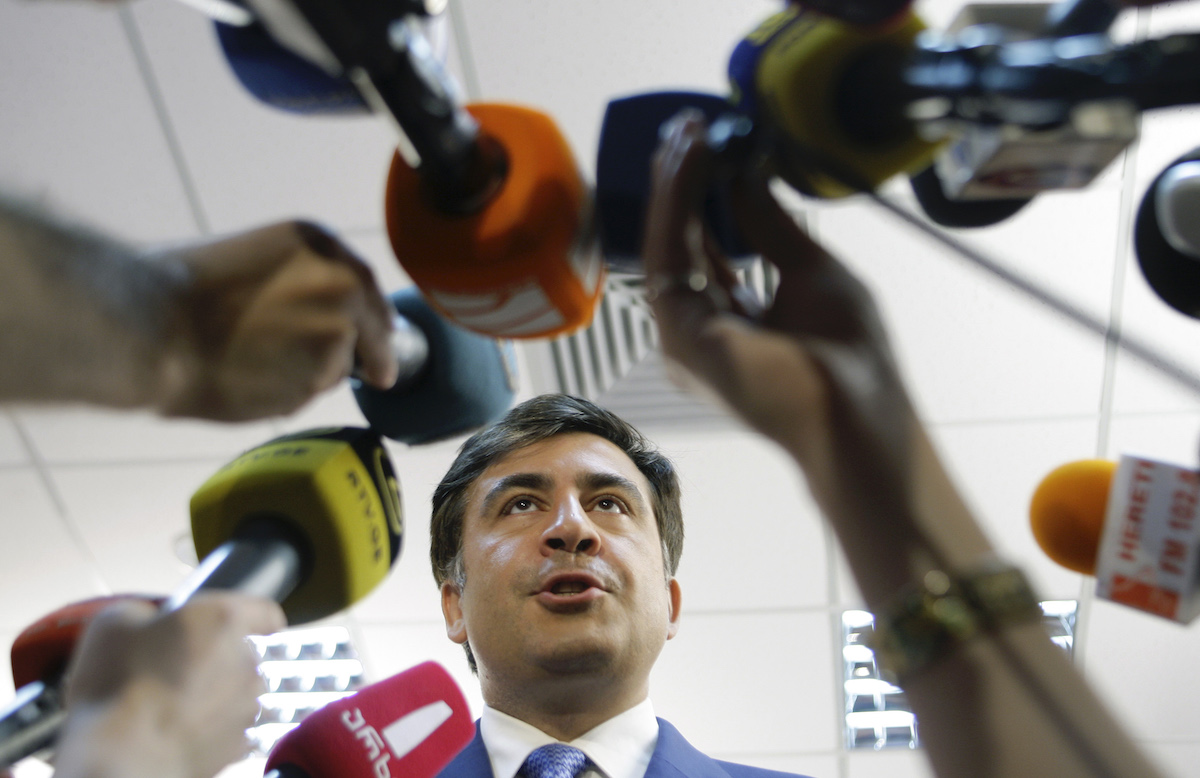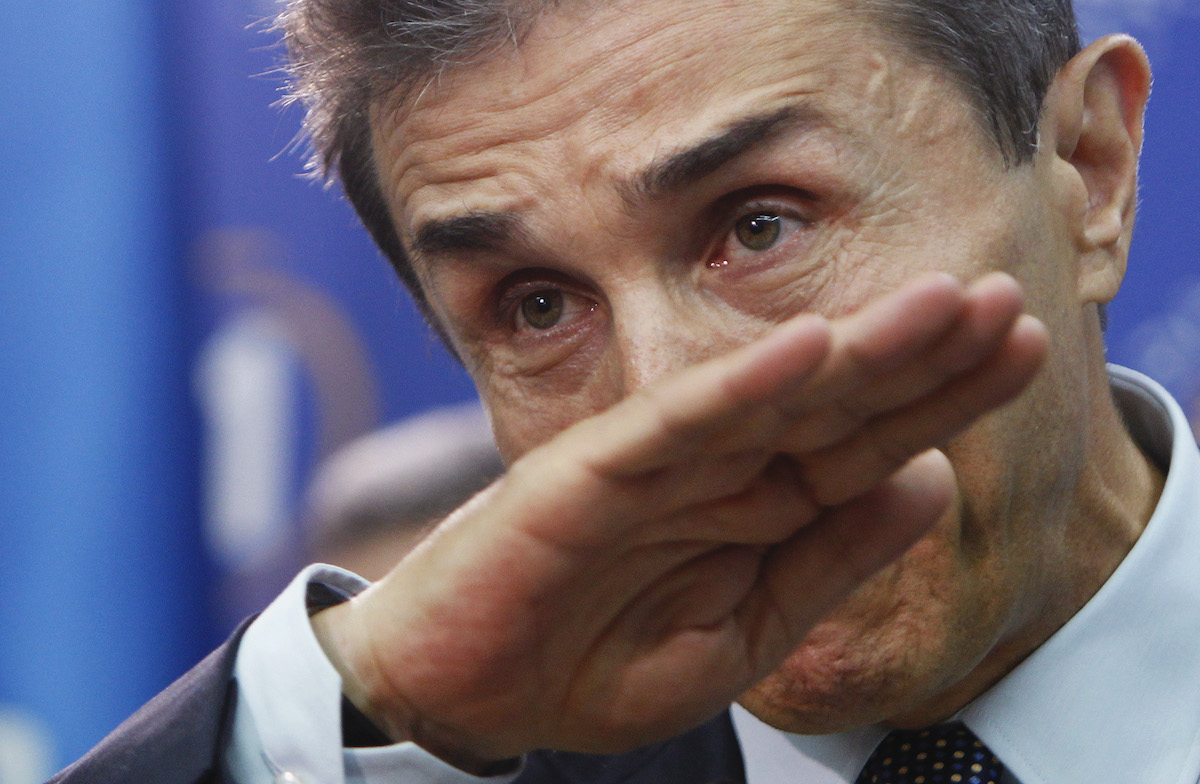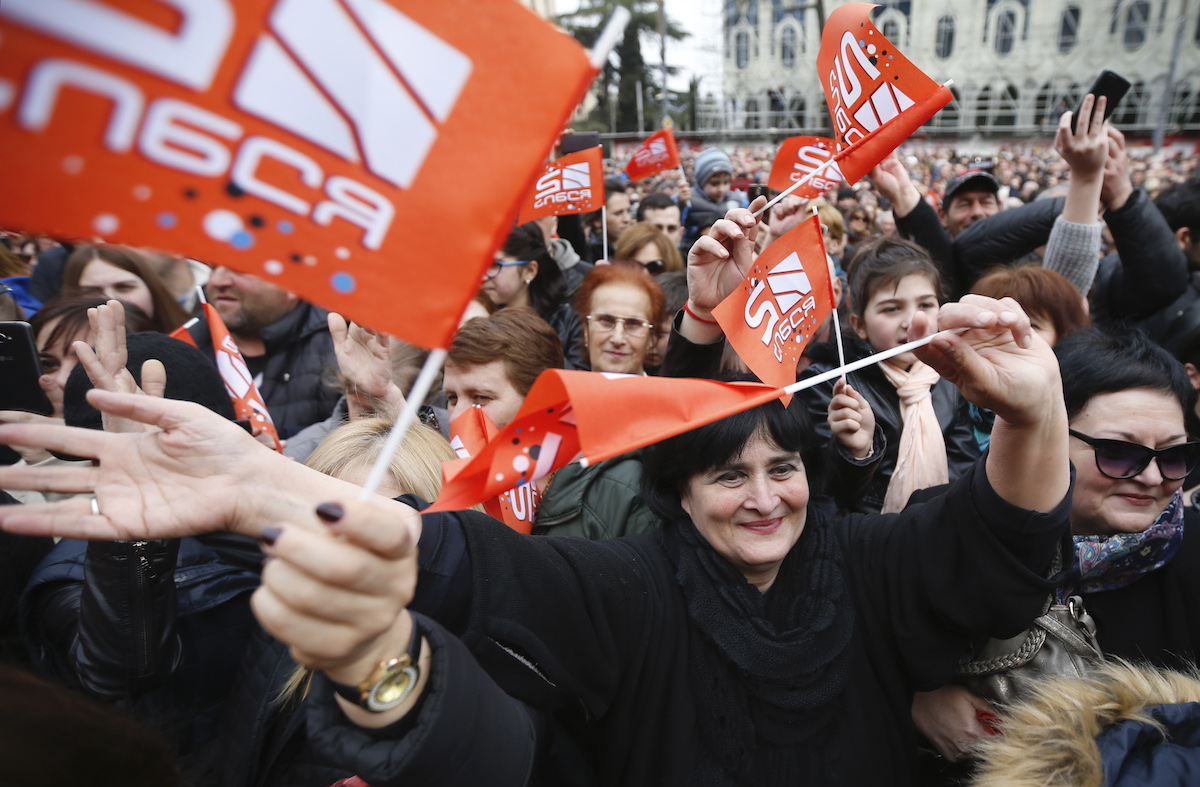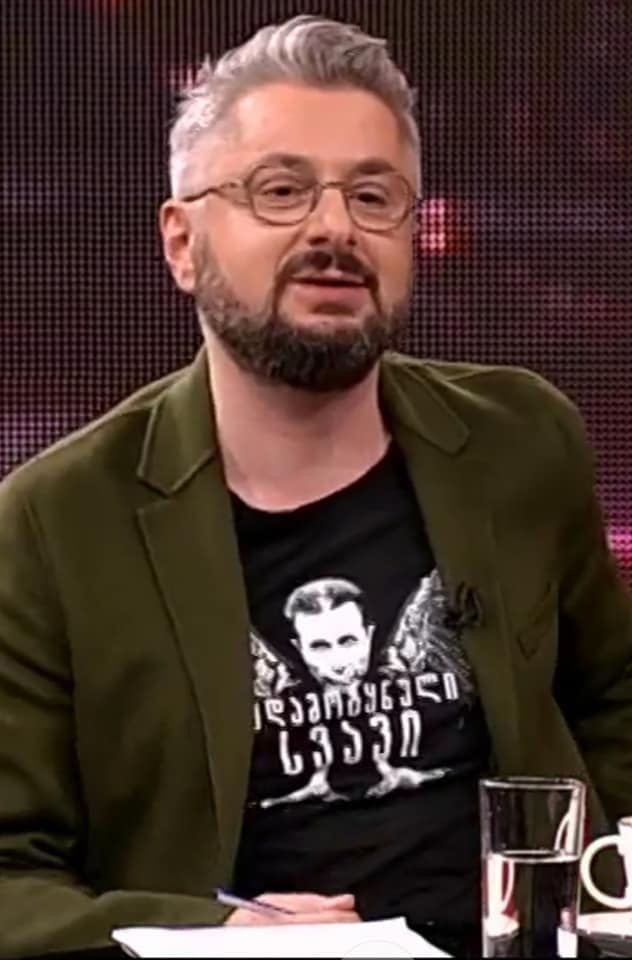The fall and rise of Georgia’s most watched TV channel – Rustavi 2
The audience of Georgian opposition-minded TV channel Rustavi 2 was in for a surprise this afternoon when it turned on the television at 12:00 to watch Kurieri [Geo. Courier] – the channel’s main news programme.
Instead of the news, viewers saw a black and white Georgian short film.
The day before, on August 20, leading producers and journalists were fired from the channel.
Of their own initiative, the presenters of Kurieri quit while on the air. They had worked at Rustavi 2 for 13 years.
“We fought, but Ivanishvili has finally occupied the television channel”, they said while saying farewell to viewers.
Journalists who have not yet been touched by the personnel changes have gone on strike.
The European Court of Human Rights (ECHR) ruled back in July that there had been no breach of legalities in the Rustavi 2 ownership dispute in Georgia, where the Supreme Court of the country earlier ruled that the channel belonged to former owner Kibar Khalvashi.
Its ruling effectively gave the green light for 100 per cent of the company’ shares to be transferred to Khalvashi.
Rustavi 2 has a special role in the modern history of Georgi. Even those critical of the channel and its editorial policy acknowledge this.
JAMnews offers the complicated history of the channel, which is almost as old as independent Georgia itself.
________________
Rustavi 2 turned 25 years old on June 1, 2019: it was founded in 1994 in the industrial city of Rustavi by university friends – David Dvali, Dzhardzhi Akimidze and Erosi Kitsmarishvili.
In the era of corruption of Shevardnadze, Rustavi 2 was the only opposition channel that broadcast throughout Georgia.
Journalists of the television company at the time were almost public heroes – they denounced officials, broadcast critical reports about corruption in the highest echelons – nothing went unnoticed.
The television station has a loyal audience, and has been historically critical of the authorities, which is why numerous governments have tried to shut it down.
In 2003, the television company played a huge role in overthrowing Shevardnadze’s government through the Rose Revolution, as a result of which the third Georgian President Mikheil Saakashvili came to power.
At that time, the channel reached its peak of popularity.
After the Rose Revolution, the station was called the ‘TV channel of the victorious people.’ Afterwards, Rustavi 2 were frequently stopped on the streets, and thanked for their work.
However, after the “Rose Revolution” and Saakashvili’s victory in the presidential election, a completely new stage began in the life of the television company.
Saakashvili’s reign
When Saakashvili came to power, hard times came for journalists accustomed to criticizing the authorities.
The government that came to power thanks to the Rose Revolution undertook painful and unpopular reforms – and a strong, critical press did not suit them.
The new authorities decided to take over the television company.
According to the founders of the television company, David Dvali and Dzhardzhi Akimidze, in 2004 they were forced to sell the channel to little-known businessman Kibar Khalvashi.
 Mikheil Saakashvili. 2010. Photo: REUTERS/David Mdzinarishvili
Mikheil Saakashvili. 2010. Photo: REUTERS/David Mdzinarishvili
Khalvashi at that time was a close friend of the then Minister of Defense, an influential official and close associate of Saakashvili – Irakli Okruashvili.
Few doubt that Khalvashi was the front man of the company and that in fact, the television had passed into the hands of Saakashvili.
“When Khalvashi arrived, Rustavi 2 was at the peak of its fame, and while it was in his hands, it was the lowest-rated television company of all time,” said Nanuka Zhorzholiani, a veteran employee of the channel, who was fired by the new management on August 20.
She said that Khalvashi’s promises to retain the integrity of the channel’s editorial policy is ridiculous, given that in 2005, Khalvashi burst into the broadcast room and demanded that the technical workers turn off the broadcast of an opposition rally.
In the Khalvashi era, well-known journalists, critical political programmes and critical plots gradually disappeared from Rustavi 2’s broadcasts.
Many people on the channel moved to work in the civil service at the invitation of the president.
Against the backdrop of the general euphoria that reigned in Georgia after the overthrow of the corrupt Shevardnadze regime, few journalists dared to confront the heroes of the Rose Revolution.
Today, many journalists admit that they made a big mistake by relegating their profession to the background.
And thus, Rustavi 2 turned from a strong opposition channel into a government propaganda machine.
However, Khalvashi only briefly owned the country’s main television channel.
Soon, the relationship between Saakashvili and Okruashvili began to deteriorate and the authorities were uncomfortable with the fact that the channel belonged to a friend of Okruashvili.
In 2006, Khalvashi sold the television company to another Georgian businessman, a close associate of Saakashvili, David Bezhuashvili.
Khalvashi later said that Rustavi 2 had simply been taken from him, and that the government had created problems for his other companies and forced him to leave Georgia. Today Khalvashi and his family live in Munich.
After that, the television company was sold more than once. The history of ownership of the television channel is long and foggy. Over the years, the channel has repeatedly passed from hand to hand.
Transparency International says that between 2004-2012, the TV channel changed ownership twenty times – all owners and persons were close to Mikheil Saakashvili.
In 2007, the authorities also took over opposition channe Imedi, owned by oligarch Badri Patarkatshvili.
As a result, all serious news channels, with the exception of the small TV channel Maestro, which broadcast only in Tbilisi, came under
Many experts believe that it was the media environment that Saakashvili created during his reign that was one of the main reasons for his defeat in the 2012 elections.
The Georgian Dream period
A new government came to power in 2012.
The Georgian Dream coalition, led by the richest man in Georgia, businessman Bidzina Ivanishvili, came to power with the main promise of finding justice to all those who suffered during the reign of Saakashvili.
In particular, Ivanishvili promised to free the TV channels from government influence, and also promised to return Rustavi 2 to its rightful owners.
 Bidzina Ivanishvili, 2012. REUTERS/David Mdzinarishvili
Bidzina Ivanishvili, 2012. REUTERS/David Mdzinarishvili
However, after the Georgian Dream came to power, the same cycle began – the major television channels that broadcast throughout the country, Imedi and the Georgian Public Broadcaster, exactly one month later became the mouthpieces of the new Georgian Dream government.
Under the control of the new government was also the small television channel Maestro, the only opposition channel in the era of Saakashvili.
Over the course of the past seven years, only Rustavi 2 has worked outside the control of the Georgian Dream. The channel remained under the influence of the opposition, in particular, ex-president Mikheil Saakashvili.
A fierce struggle against Rustavi 2, unending litigation in the courts between the owners, and the arrest of the property of Rustavi 2 continued throughout all these years.
In addition to Khalvashi, the channel’s first owners, David Dvali and Dzhardzhi Akimidze also fought to have their ownership rights to the channel restored, claiming Saakashvili had taken the channel from them as well.
Most of the public sympathised with them, and not Khalvashi. However, their case did not reach the courts.
The reason for this, media experts say, is that Dvali and Akimidze were uncomfortable partners for Ivanishvili, and if he returned the television company to them, it would be much more difficult to manage them than Khalvashi.
Another story that happened over these seven years and which directly relates to the situation around Rustavi 2 is the sudden death of its first owner – Erosi Kitsmarishvili.
Erosi Kitsmarishvili, who founded the television company in 1994 along with Dvali and Akimidze, was found dead on July 15, 2014 in his car in the underground parking lot of his own house with a fatal gunshot wound to the head.
Law enforcement authorities immediately said that it was a case of suicide, but his friends, colleagues and relatives say this is impossible.
A police investigation into the death of the former influential media tycoon is shrouded in many secrets and leaves many questions unanswered.
Before his death, Kitsmarishvili repeatedly stated that only he had documents and facts that would prevent Ivanishvili from seizing Rustavi 2.
The age of Nika Gvaramia
To say that Rustavi 2 has simply been an opposition channel in the past seven years is to say little.
The television company has been led by an eccentric and bright director for seven years – former prosecutor and associate of Saakashvili Nika Gvaramia.
Gvaramia caused serious discomfort for the authorities, who in turn did not hide their animosity for him.
During this time, Rustavi 2 journalists prepared hundreds of stories in which they exposed authorities caught in corruption and nepotism, made scandalous reports about the security forces and the judicial system, published investigations about the informal rule of Ivanishvili and the business interests of his relatives.
 People wave flags with the Rustavi 2 logo during a rally in support of the television company in Tbilisi, Georgia, on March 11, 2017. REUTERS / David Mdzinarishvili
People wave flags with the Rustavi 2 logo during a rally in support of the television company in Tbilisi, Georgia, on March 11, 2017. REUTERS / David Mdzinarishvili
In his interviews, Ivanishvili has not hidden his hostility for the channel and its journalists.
He has called Rustavi 2 a “machine of lies”, which prevents the Georgian Dream from building a state.
“If you were to turn off Rustavi 2 today, the only thing you would see is the revival and rise of the country”, he said in an interview.
In the same interview, Ivanishvili said that the channel holds a part of society hostage – he promised that the channel would stop doing this very soon.
“Rustavi-2 will not have the opportunity – and this I promise you – to hold a very large part of the population hostage,” Ivanishvili said. At the time, the television company perceived these words as a threat.
The leadership of Rustavi 2 did not deny its sympathy for Saakashvili’s United National Movement party and for him personally, but justified this by the fact that the channel was friendly to all pro-Western and anti-Russian parties:
“The United National Movement is the main pro-Western party in Georgia and yes, we sympathize with them”, said Nika Gvaramia, the former general director of the channel.
Gvaramia eventually went into full confrontation with Ivanishvili, using obscene words to describe him, calling a pro-Russian ‘usurper’ and in a live programme wore a T-shirt with insults addressed to Ivanishvili.

Thus, Gvaramia became Ivanishvili’s personal enemy, and Rustavi 2 was the number one problem – the only obstacle that the informal leader of Georgia had not been able eliminate in the past seven years, Georgian experts say.
However, in the end, a year before the decisive parliamentary elections of 2020, Ivanishvili still managed to neutralize Rustavi 2.
Ironically, this happened with the help of the European Court of Human Rights.
The former and current owner
The decision of the Strasbourg court in the Rustavi 2 case was announced on July 18 – the European court found no violations by the state in the trial of the ownership of the television company and lifted the temporary ban on the execution of the decision of the Georgian court.
This decision led to a change in ownership of the channel – the channel was transferred to the ownership of Khalvashi, who had clearly been supported by Ivanishvili throughout the struggle.
Khalvashi re-registered the channel the same day, appointed a new director and promised that he would not touch the journalists or change the editorial policy of the channel.
However, three weeks after the decision of the ECHR court, he said that he was selling the company, as it had a lot of debt.
One month and two days later, on August 20, the new director of the TV channel Paata Salia dismissed the head of the information service and several leading journalists, including Giorgi Gabunia, who earlier cursed the Russian president live on the air.
What next?
Media pluralism may be under threat in Georgia, political observers say.
In addition to Imedi and Rustavi 2, there are several smaller TV news stations.
Kavkasia is a small television company founded in the early 90s, which has had constant financial, technical problems and a small number of viewers.
As for TV Pirveli, it was founded in 2015 and during this time has managed to gain popularity mainly due to the fact that very famous journalists gathered there, at various times for various reasons leaving the pro-government TV channels.
This quite well-to-do TV channel does not yet have an audience as large as Rustavi 2. It is more popular in Tbilisi and big cities.
However, the authorities are clearly concerned about the growing popularity of TV Pirveli.
Experts say this is the reason that the owner of the television is involved in the TBC Bank money laundering case that dates back to 2008, for which he is often summoned to the prosecutor’s office.
In early August, the television company’s server was attacked by hackers, which also raised many questions.
Former Rustavi 2 CEO Nika Gvaramia has announced the creation of a new channel – Mtavari arkhi [Geo. Main Channel], which, he says, will begin broadcasting in late autumn.
TV channel Formula will also appear on the airwaves in October. The channel will be created by production company Formula Creative, with the support of David Kezerashvili, the former minister of defence.
It is expected that the journalists who left Rustavi 2 will largely be redistributed between these two channels.
Thus, there is a chance that by decapitating Rustavi 2, Ivanishvili will immediately receive two new opposition channels in return.
However, these prospects are foggy – new T V companies will need a lot of money and a lot of resources to fill the vacuum that has formed in the media field of Georgia after the seizure of the most famous Georgian media brand.


















